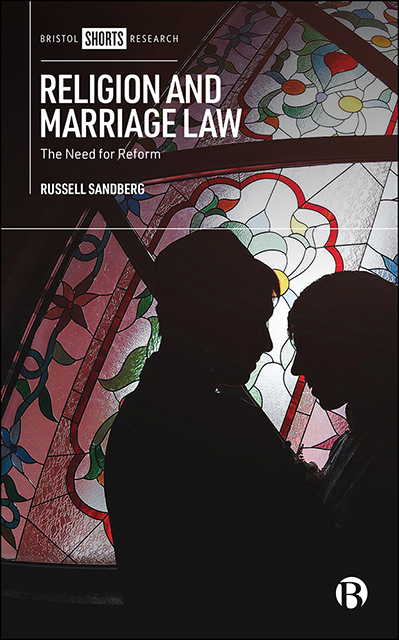Eight - Reforming Validity and Criminal Offences
Published online by Cambridge University Press: 18 April 2023
Summary
Introduction
This chapter turns to the fourth and fifth reform proposals. While the proposals discussed in the last chapter were directly concerned with how people get married, the proposals discussed here are concerned with related laws which concern the effect and regulation of marriage: looking at the law on what constitutes a valid marriage and possible criminal offences. The proposals discussed in the previous chapter will not be sufficient to overcome the problem of unregistered religious marriages which are entered into unwittingly or involuntarily. The proposals discussed here and in the next chapter serve as backstops to provide further protection in such a scenario.
The two backstops discussed here, the law on validity and criminal offences, would be needed less if the sixth proposal is enacted and there is reform of cohabitation rights. For that reason, cohabitation law reform is discussed separately in the next chapter. Of the two backstops discussed in this chapter, the law on validity is the most crucial. However, new criminal offences have been seen as the answer to the problem of unregistered marriages, most notably by the Independent Review and a number of commentators, as well as in the provisions of Baroness Cox's Marriage Act 1949 (Amendment) Bill. Yet, criminal offences will have a very limited effect, limited to just preventing and discouraging certain forms of behaviour. The most appropriate remedy is not criminal at all but is about providing appropriate rights on relationship breakdown. The reforms presented in this part are designed as a package: implementing just the criminal law provisions would have very little effect.
The law on validity
Provisions on validity can mitigate the problem of unregistered religious marriage by declaring such marriages either valid or void (rather than non-qualifying ceremonies) and therefore enabling the parties to seek legal redress on relationship breakdown. The current law on validity is complex and the Court of Appeal in Attorney General v Akhter took the view that any formulation of what actions would cumulatively lead to a marriage being void rather than non-qualifying would be unwise, since the Court ‘would not want to encourage parties who want to marry to rely on such partially compliant ceremonies because the outcome will, inevitably, be uncertain’ (para 66). Yet, a lack of clarity as to the difference between void and non-qualifying ceremonies will actually frustrate legal certainty.
- Type
- Chapter
- Information
- Religion and Marriage LawThe Need for Reform, pp. 119 - 128Publisher: Bristol University PressPrint publication year: 2021



